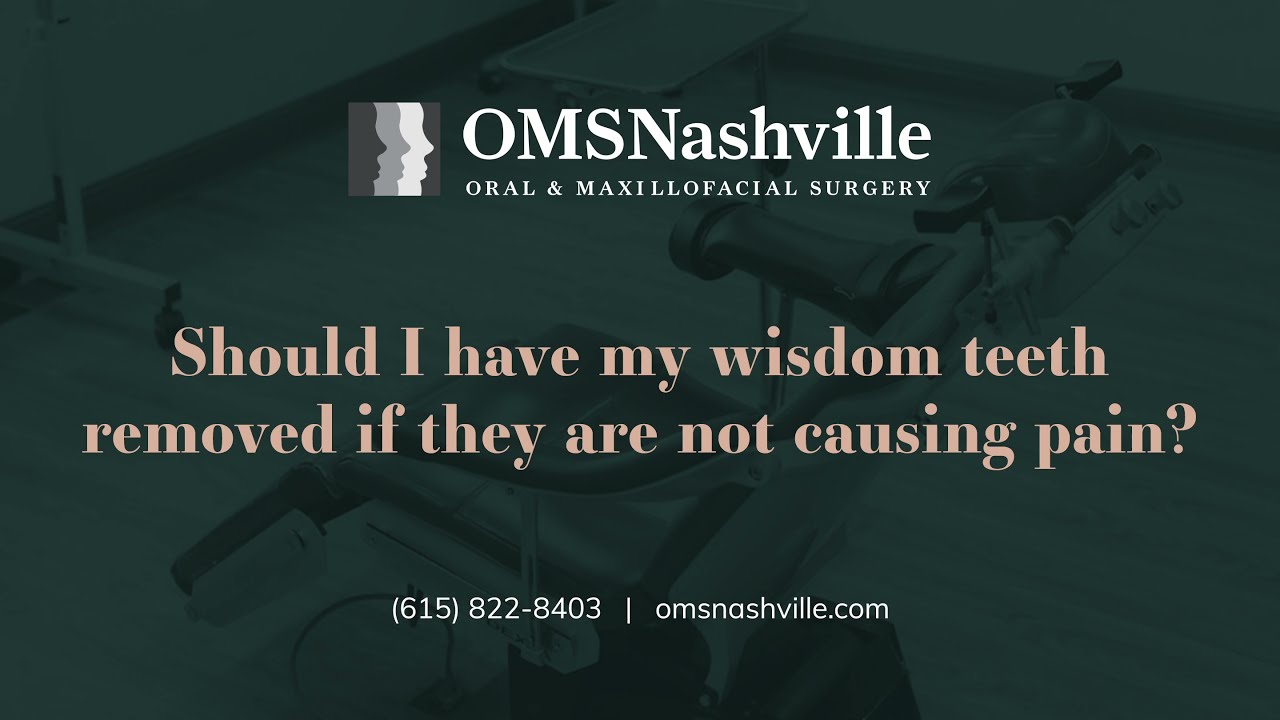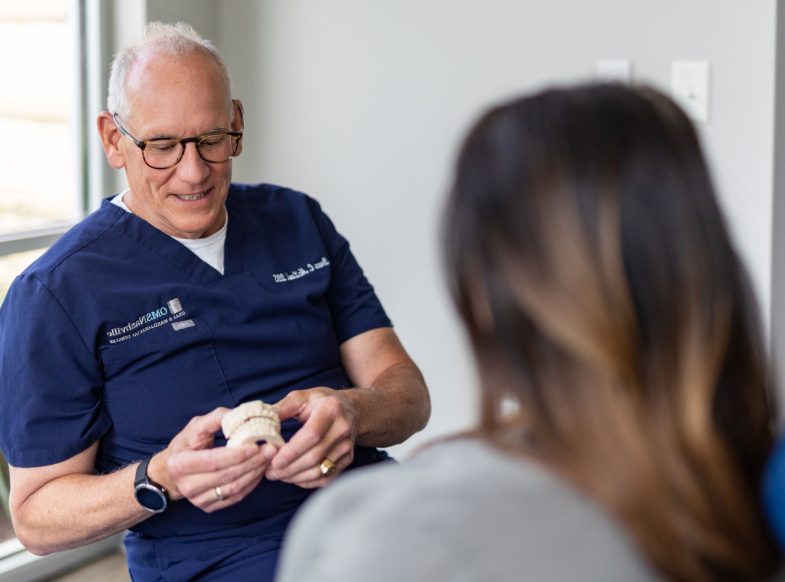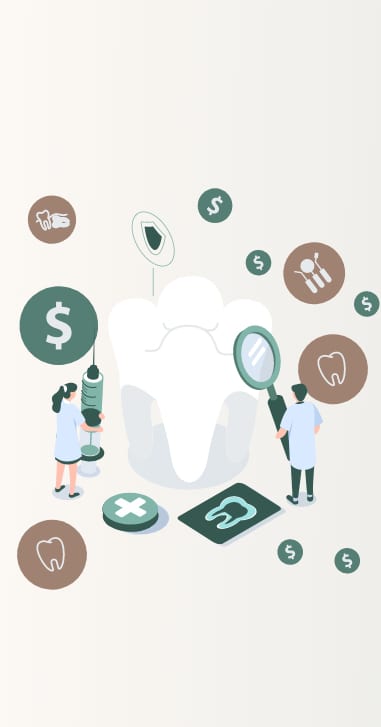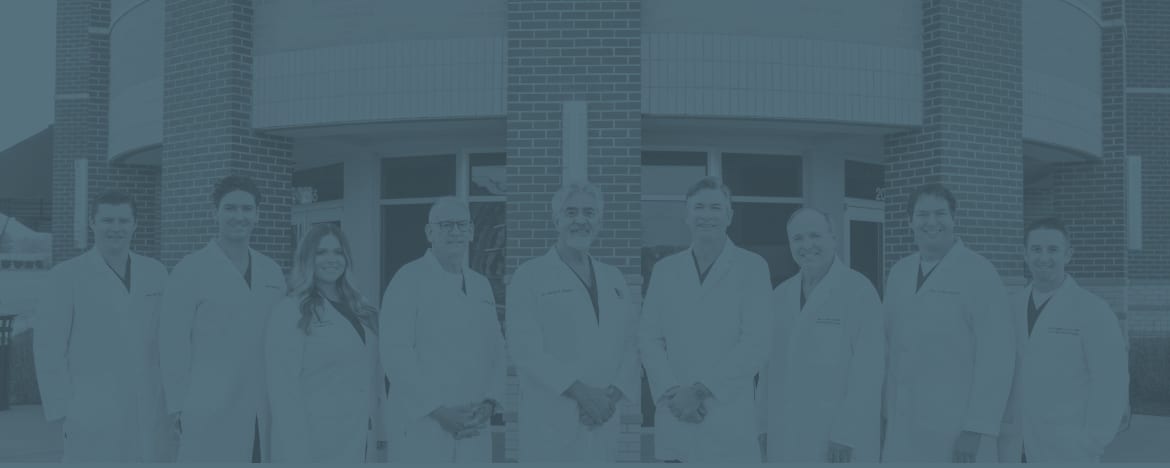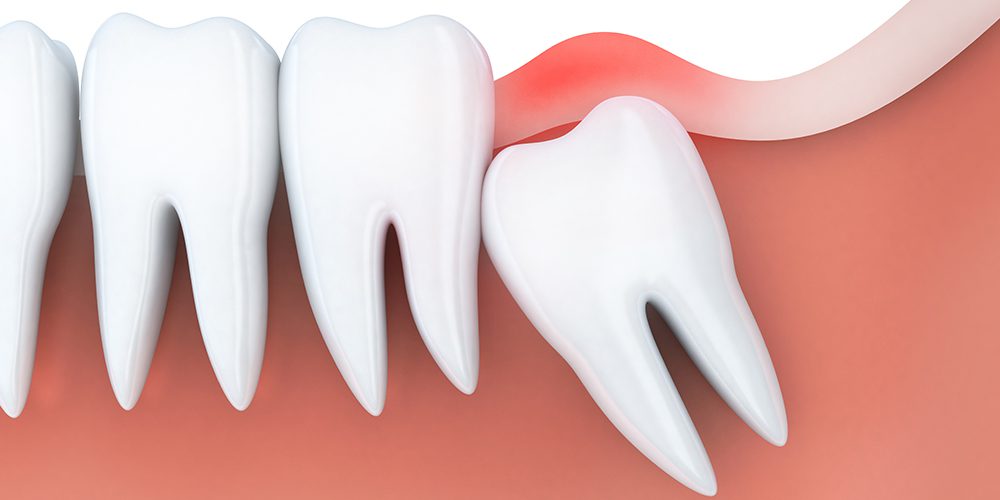
The wisdom teeth are the third set of molars located in the very back of the mouth. Typically, they erupt between the ages of 17 and 25. When that happens, it can lead to a number of complications, including pain, infection, gum disease, and crowding in the mouth. Often, the best way to deal with these complications is to remove the wisdom teeth completely.
At OMS Nashville, we boast decades of experience handling wisdom tooth extraction. Our oral surgeons perform multiple wisdom teeth removals every single day. Thanks to that experience, our patients can trust us to provide the highest standards of comfort and care.
We invite you to learn more about our approach to wisdom teeth removal in Nashville, TN.
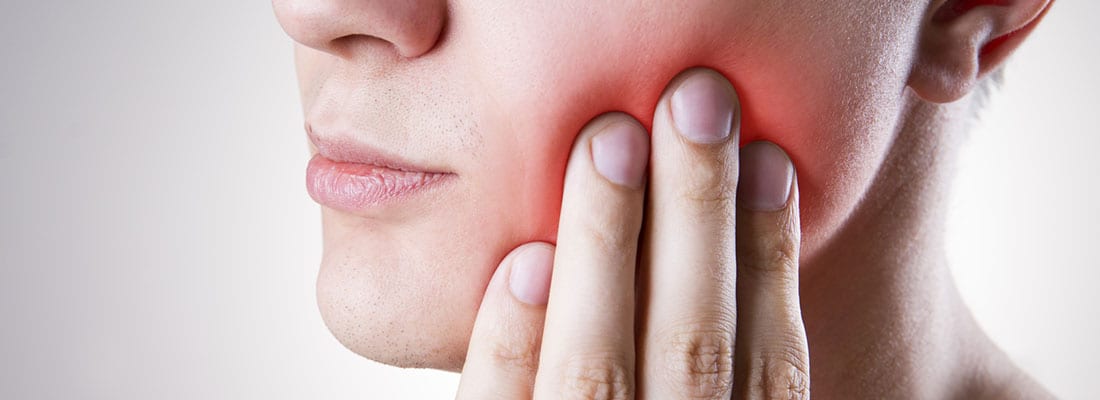
Why is Wisdom Teeth Removal Often Needed?
For many patients, wisdom teeth never fully or even partially enter the mouth. Often the jaw is not large enough, and the wisdom teeth are in the wrong position, blocked from coming in the mouth through the gums by bone or other teeth, causing them to become impacted. The impacted wisdom teeth can take many positions in the bone as they attempt to find a pathway that will allow them to erupt successfully. If they do partially erupt, this can cause a “food trap” where the opening around the teeth allows plaque to accumulate and bacteria to grow—the result: swelling, stiffness, pain, and illness. The pressure from the erupting wisdom teeth may move other teeth and disrupt the orthodontic or natural alignment of teeth. Tumors or cysts can form around the impacted wisdom teeth as well, resulting in the destruction of the jawbone and healthy teeth. Removal of the offending impacted teeth usually resolves these problems. Early removal is recommended to avoid future problems and to decrease the surgical risk involved with the procedure.
At What Age Should We Have Our Wisdom Teeth Removed?
There is not a steadfast rule about when to have wisdom teeth removed because it all depends on the patient. Wisdom teeth typically begin erupting in the late teens or early 20s, at which point it is recommended that you consult with your dentist about whether those molars need to come out.
So, Why Do You Have Wisdom Teeth in the First Place?
Our patients often ask us why they have these teeth in the first place. The short answer is that the human mouth has adapted over time. Thanks to knives and forks, we no longer need the intense chewing power that our ancestors required. Because of this, the human jaw is a bit smaller than it used to be… and yet, a majority of us are still born with these extra molars in the back of the mouth.
Signs Your Wisdom Teeth Need to Be Removed
Your dentist will usually be the one to tell you that your wisdom teeth are causing a problem and require extraction. Some of the telltale signs include:
Impacted Wisdom Teeth
Often, wisdom teeth simply do not have enough space to erupt fully and to develop normally. This can manifest in jaw pain, bleeding gums, or even difficulty opening the mouth.
Incorrect Growth
In other situations, wisdom teeth fully erupt but take up too much space in the mouth. This can lead to overcrowding, and ultimately hygiene issues. This rarely can be corrected with braces.
Cystic Growth
Sometimes, small fluid-filled sacs, known as cysts, form around the wisdom tooth. When left untreated, a cyst can actually cause damage to the gums and the underlying bone.
Do You Really Have to Get Your Wisdom Teeth Removed?
Not everyone has to worry about wisdom teeth extraction. For instance, some people are born without any wisdom teeth. And even if you do have wisdom teeth, it is possible that they will not cause any pain or complications.
However, wisdom teeth can often become impacted, which means they are unable to completely erupt through the gum tissue. This can cause a number of problems, not the least of which is suboptimal oral hygiene. When you have impacted wisdom teeth, it is generally recommended that you have them taken out, even if you do not have any pain or physical discomfort.
Ultimately, patients have very little control over whether they need to have their wisdom teeth removed. The best you can do is stay up to date with routine dental appointments, ensuring the situation with your wisdom teeth is closely monitored.
-
Impacted Wisdom Teeth Explained
When we say that a wisdom tooth is impacted, we basically mean that it is buried. Rather than completely emerging from the gums, an impacted wisdom tooth remains either partly or completely submerged in the gums and/or bone.
What makes this such a big problem? The main issue is that if you have a tooth that is buried underneath your gums and/or bone, it is impossible for you to keep that tooth clean. Not only can this result in tooth decay, but it can also contribute to gum disease. In rarer circumstances, this can also lead to the formation of cysts and tumors.
-
What Do Impacted Wisdom Teeth Look Like?
It is possible that you could have impacted wisdom teeth and not even know it. That is what makes it so important to stay current with your dental X-rays. Through advanced imaging, your dentist can identify any teeth that remain submerged under the gums and/or bone. Consider an example of what an impacted wisdom tooth X-ray might look like.
-
Prevent Future Dental Problems
Wisdom teeth may cause pain and discomfort, either immediately or in the long run. This is another reason why it is often best to simply have them extracted: Even if they are not bothering you right now, they could lead to problems in the future.
In addition to the risks of tooth decay and periodontal disease, wisdom teeth may also cause crowding. That is, they may push your other teeth and even cause them to grow in an abnormal direction, simply due to a lack of space within the mouth.
Wisdom teeth extraction can be a wise way to minimize these risks before they become more serious problems.
About Our Practice
For more than 30 years, OMS Nashville has provided high-quality care, including wisdom teeth removal, to patients throughout the area. Our practice boasts convenient locations throughout Nashville, but what really sets us apart is our high level of expertise. We invite you to learn more about the team of oral healthcare providers here at OMS Nashville.
Should I Have All of My Wisdom Teeth Out at Once?
Generally, it makes sense to have all of your wisdom teeth removed at once, even if not all of them appear to be problematic. The reason for this is simple: By having all of them removed during the same procedure, you can minimize your cost, your risk of a surgical complication, and your recovery time. After all, most patients would vastly prefer having a single surgical procedure than running the risk that they might need follow-up surgery later on.
How Much Does It Cost to Remove My Wisdom Teeth?
The cost of wisdom teeth removal can vary based on a number of different factors. These include the number of wisdom teeth you are having removed, as well as whether any of them are impacted. The best way to get an individualized quote is to come in for a one-on-one consultation with one of our surgeons. We are also happy to talk with you about the financing options we provide.
Will My Dental Insurance Cover Wisdom Teeth Removal?
Wisdom teeth removal is usually considered to be a medical necessity. Because of this, most dental insurance plans will cover it. At OMS Nashville, our team will work to ensure you get the maximum coverage from your insurance company. Additionally, we can help with a range of flexible financing and payment options.
What to Expect for Wisdom Teeth Removal
-
Preparing for the Procedure
The process typically begins with a consultation. Your oral surgeon will take some X-ray images and also perform a general evaluation to assess the health of your mouth. During this consultation, we will be happy to answer any questions you may have and to walk you through the steps of the surgery. Additionally, we will discuss the different options we offer for sedation.
-
Anesthesia Options
At OMS Nashville, we want to ensure our patients are as comfortable as possible throughout their procedure. To achieve this level of comfort, we are happy to offer a couple of different sedation options.
-
IV Sedation
For more complex procedures, including those that involve multiple wisdom teeth or impacted wisdom teeth, we are happy to offer our patients full sedation via intravenous (IV) sedation.
-
Local Anesthesia
For simpler procedures, we may be able to keep you out of pain without the need for full sedation. Local anesthesia is a potential option.
-
During the Procedure
Once the anesthesia has been administered, your surgeon will make any necessary incisions to the gums, fully exposing the wisdom tooth and underlying bone. If there is any bone blocking access to the tooth root, this bone must be removed. Often, the tooth is divided into smaller sections for easy removal and then carefully extracted.
-
How Long Does the Procedure Take?
The total amount of time required for wisdom teeth removal can vary depending on the nature of the extraction and the number of teeth you are having removed. Usually, however, patients can anticipate that their surgery will last for no more than 45 minutes. Note that wisdom teeth removal is an outpatient surgery, meaning you will be able to return home shortly after the procedure is concluded.
-
Immediately After the Procedure
Your oral surgeon and the staff will go over important instructions with you, including key guidelines about managing pain, handling bleeding, hygiene instructions, and what you can and cannot eat.
-
How Long are You Loopy After the Procedure?
You may continue to feel a little disoriented following your wisdom tooth removal, especially if you receive full sedation. The good news is that this effect will wear off shortly. If you have ongoing complications from the sedation, do not hesitate to contact our office directly.
-
Have a Ride Home
If you are being sedated for your procedure, you will not be allowed to drive yourself home. For your own safety and the safety of others, make sure a friend or family member accompanies you to the procedure so that they can drive you back home afterward.
-
Diet
After general anesthetic or I.V. sedation, nourishment and fluids should be taken regularly to prevent dehydration. Colder, softer foods and liquids are usually preferred to avoid disrupting the surgical sites. You will feel better, have more strength, less discomfort, and heal faster if you continue to get the appropriate nourishment.
Recovery from Wisdom Teeth Removal Procedure: The Process
Following your wisdom teeth removal, you will need to allow some time for your mouth to heal. Here are some general instructions for navigating this recovery process.

-
What is the Wisdom Teeth Recovery Time? How Long to Heal?
The total timeline for wisdom teeth recovery may take up to two weeks, though for some patients, it may be much shorter. During this time, you can anticipate having some swelling, which usually subsides after the first couple of days. There may also be mild bruising around your cheeks. Your jaw may feel sore and stiff, which can last for seven to 10 days. And, you may experience some physical pain, the worst of which wears off within two or three days.
-
How Long Should I Expect to Be Out of Work or School?
Patients often want to know how much time off they should take for their wisdom teeth extraction. Most patients feel ready to head back to school or work within a few days after their procedure.
-
How Long Does the Pain Last After Having My Wisdom Teeth Removal?
You may experience slight pain or discomfort following your wisdom teeth removal procedure. Any significant discomfort typically subsides within 48 to 72 hours.
Wisdom Teeth Removal and Eating Food
Following a wisdom teeth removal procedure, you will have some temporary dietary restrictions. Following these restrictions can help expedite your recovery and minimize discomfort and pain.
How Long After Removal Can I Eat?
First of all, how long will you need to wait before you can have something to eat? Thankfully, you do not need to wait long at all. Give it about an hour, after which you can remove the gauze bandages from your mouth and grab a snack. Remember to start with something soft.
What Foods Can I Eat After Having My Wisdom Teeth Removed?
For the first 24 hours after surgery, you will want to stick with soft, easy-to-chew foods. In addition, we would recommend that you avoid foods that are hot and spicy, which may cause irritation and pain. Finally, we recommend that you refrain from drinking with a straw for the first 24 hours of your recovery.
List of Soft Foods to Eat After Removal
- Yogurt
- Ice cream
- Applesauce
- Scrambled eggs
- Mashed potatoes
- Broths and blended soups
When Can I Eat Normally After Wisdom Teeth Removal?
We would recommend sticking with a very limited, soft diet for at least the first 24 hours. You may resume eating normally when you begin to feel better, and specifically once you find that your pain and swelling are decreasing. Some patients may prefer to gradually adopt a more normal diet over the course of a week or so.
